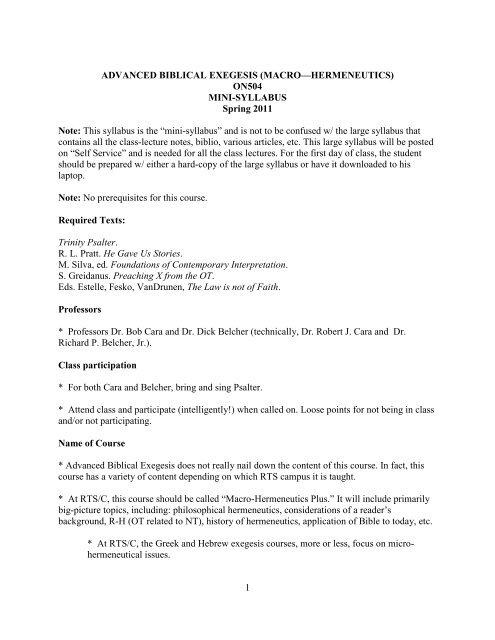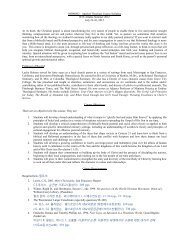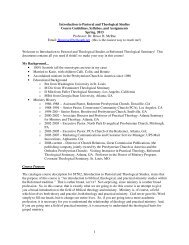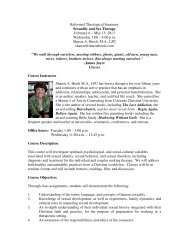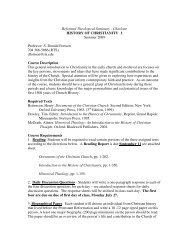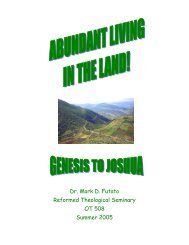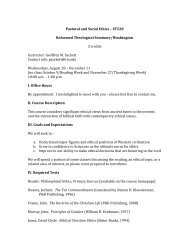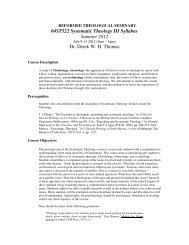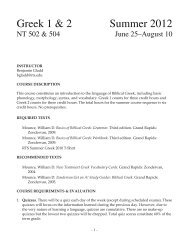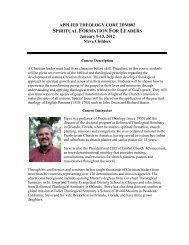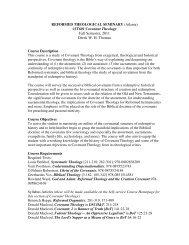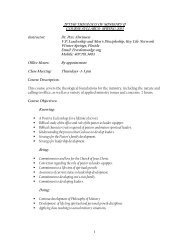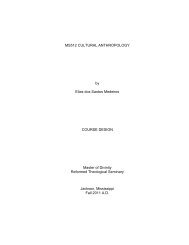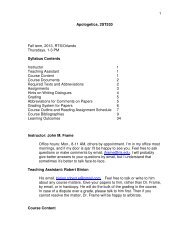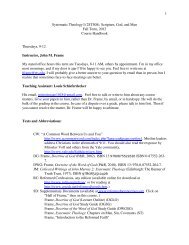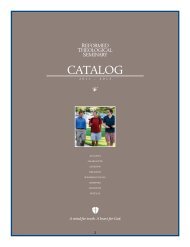MACROâHERMENEUTICS - Reformed Theological Seminary
MACROâHERMENEUTICS - Reformed Theological Seminary
MACROâHERMENEUTICS - Reformed Theological Seminary
You also want an ePaper? Increase the reach of your titles
YUMPU automatically turns print PDFs into web optimized ePapers that Google loves.
ADVANCED BIBLICAL EXEGESIS (MACRO—HERMENEUTICS)<br />
ON504<br />
MINI-SYLLABUS<br />
Spring 2011<br />
Note: This syllabus is the “mini-syllabus” and is not to be confused w/ the large syllabus that<br />
contains all the class-lecture notes, biblio, various articles, etc. This large syllabus will be posted<br />
on “Self Service” and is needed for all the class lectures. For the first day of class, the student<br />
should be prepared w/ either a hard-copy of the large syllabus or have it downloaded to his<br />
laptop.<br />
Note: No prerequisites for this course.<br />
Required Texts:<br />
Trinity Psalter.<br />
R. L. Pratt. He Gave Us Stories.<br />
M. Silva, ed. Foundations of Contemporary Interpretation.<br />
S. Greidanus. Preaching X from the OT.<br />
Eds. Estelle, Fesko, VanDrunen, The Law is not of Faith.<br />
Professors<br />
* Professors Dr. Bob Cara and Dr. Dick Belcher (technically, Dr. Robert J. Cara and Dr.<br />
Richard P. Belcher, Jr.).<br />
Class participation<br />
* For both Cara and Belcher, bring and sing Psalter.<br />
* Attend class and participate (intelligently!) when called on. Loose points for not being in class<br />
and/or not participating.<br />
Name of Course<br />
* Advanced Biblical Exegesis does not really nail down the content of this course. In fact, this<br />
course has a variety of content depending on which RTS campus it is taught.<br />
* At RTS/C, this course should be called “Macro-Hermeneutics Plus.” It will include primarily<br />
big-picture topics, including: philosophical hermeneutics, considerations of a reader’s<br />
background, R-H (OT related to NT), history of hermeneutics, application of Bible to today, etc.<br />
* At RTS/C, the Greek and Hebrew exegesis courses, more or less, focus on microhermeneutical<br />
issues.<br />
1
Course Objectives<br />
* The overarching purpose is for the student to interact with a variety macro-hermeneutical<br />
issues, including <strong>Reformed</strong> models, to enable the student to better interpret/apply the Bible.<br />
* Course objectives as coordinated with MDiv Student Learning Outcomes are shown at the end<br />
of this document.<br />
Structure of the Course<br />
* Cara, first 6 weeks.<br />
* Three units: (1) PM vs M w/in a CVT framework. (2) Macro-hermeneutics per se.<br />
(3) Review of Cara’s hermeneutical proverbs.<br />
* Belcher, second 6 weeks.<br />
* Three units: (1) History of interpretation of the Bible: Philo through modern day. (2)<br />
NT use of OT, including NT writers’ hermeneutical context. (3) Preaching X from the<br />
OT: Typology and Greidanus.<br />
* Cara, Belcher, and Kruger 13th week, Covenant Structure of Bible<br />
Course Requirements and Grades<br />
* Final Test<br />
* Test will be ≈ 85-90% verbatim of Lecture Review Questions. The remainder will be<br />
miscellaneous questions from the class lectures and readings.<br />
* For answers to Lecture Review Questions, you may/should enquire of fellow students<br />
in this class.<br />
* 40% of grade.<br />
* Pratt’s He Gave Us Stories, pages 1-128, 306-402.<br />
* Submit a fake (i.e., no or few footnotes) 7-10 page paper that includes:<br />
* A statement that student read 100% of Pratt reading requirement.<br />
* Self-consciously evaluate one or more aspects of the student’s interaction w/in<br />
his covenant community (both heritage and present) that has (or will have)<br />
influenced the student’s biblical interpretation (BT/R-H/ST). This influence can<br />
be either positive, negative, or both.<br />
* The paper should show knowledge of your covenantal community, and<br />
catetgories in Pratt’s book and Cara’s lectures.<br />
* Although no research is required, this paper should have a sophisticated<br />
2
understanding of macro-hermeneutics and indicate that the student can<br />
“theologize” about himself relative to his theological community.<br />
* Paper due on last day of Cara’s lectures (≈ half-way through semester). Give to Cara.<br />
32 f/s/s.<br />
* 25% of grade.<br />
* Silva, M., ed. Foundations of Contemporary Interpretation.<br />
* Read anyone of the books in this book, excepting God, Language and Scripture.<br />
* Submit a (fake) 7-10 page paper that includes:<br />
* A statement that student read 100% of book w/in the book.<br />
* Summarize book (1/3 of paper).<br />
* Critique one small or large section in the book (2/3 of paper). The critique<br />
should show knowledge of Cara/Belcher lectures and the ability of the student to<br />
theologize about hermeneutics.<br />
* Paper due on last day of Belcher’s lectures. Give to Belcher. 32f/s/s.<br />
* 25% of grade.<br />
* Read all of Greidanus’ Preaching X from the OT and selected articles from<br />
Estelle/Fesko/VanDrunen’s The Law is not of Faith.<br />
* On final test will be the question, “Did you read 100% of the assigned reading?”<br />
* 10% of grade.<br />
3
Course:<br />
Professor:<br />
Campus:<br />
Course Objectives Related to MDiv Student Learning Outcomes<br />
With Mini-Justification<br />
ABX/Macro-Hermeneutics<br />
Robert J. Cara and Richard P. Belcher<br />
Charlotte<br />
Date: Nov 2010<br />
MDiv Student Learning Outcomes Rubric Mini-Justification<br />
Articulation<br />
(oral & written)<br />
Scripture<br />
<strong>Reformed</strong><br />
Theology<br />
Sanctification<br />
Broadly understands and articulates knowledge, both<br />
oral and written, of essential biblical, theological,<br />
historical, and cultural/global information, including<br />
details, concepts, and frameworks.<br />
Significant knowledge of the original meaning of<br />
Scripture. Also, the concepts for and skill to research<br />
further into the original meaning of Scripture and to<br />
apply Scripture to a variety of modern circumstances.<br />
(Includes appropriate use of original languages and<br />
hermeneutics; and integrates theological, historical, and<br />
cultural/global perspectives.)<br />
Significant knowledge of <strong>Reformed</strong> theology and<br />
practice, with emphasis on the Westminster Standards.<br />
Demonstrates a love for the Triune God that aids the<br />
student’s sanctification.<br />
Moderate<br />
Moderate<br />
Moderate<br />
Minimal<br />
1. Submits one self-reflected<br />
hermeneutics paper.<br />
2. Submits one critical book review.<br />
3. Significant overview of the history of<br />
hermeneutics, both in the church and<br />
philosophy, is included.<br />
1. Scriptures’ interpretation of Scripture is<br />
included.<br />
2. Scriptures’ understanding of “meaning”<br />
is evaluated.<br />
1. Overview of <strong>Reformed</strong> view of General<br />
and Special Revelation.<br />
2. <strong>Reformed</strong> hermeneutics.<br />
3. History of <strong>Reformed</strong> denominations.<br />
1. Psalm singing in class<br />
2. Self-reflection paper.<br />
Desire for<br />
Worldview<br />
Winsomely<br />
<strong>Reformed</strong><br />
Preach<br />
Burning desire to conform all of life to the Word of God.<br />
Embraces a winsomely <strong>Reformed</strong> ethos. (Includes an<br />
appropriate ecumenical spirit with other Christians,<br />
especially Evangelicals; a concern to present the Gospel<br />
in a God-honoring manner to non-Christians; and a<br />
truth-in-love attitude in disagreements.)<br />
Ability to preach and teach the meaning of Scripture to<br />
both heart and mind with clarity and enthusiasm.<br />
Strong<br />
Strong<br />
Moderate<br />
1. The Bible is the ultimately authority of<br />
hermeneutical questions.<br />
2. Student’s background affects<br />
hermeneutics.<br />
1. The ethos of RTS is presented and<br />
evaluated as to how that affects<br />
hermeneutics.<br />
1. Section of hermeneutics of “modern<br />
meaning.”<br />
Worship<br />
Knowledgeable of historic and modern Christianworship<br />
forms; and ability to construct and skill to lead<br />
a worship service.<br />
None<br />
Shepherd<br />
Ability to shepherd the local congregation: aiding in<br />
spiritual maturity; promoting use of gifts and callings;<br />
Minimal<br />
1. Understand one’s own background is<br />
an aid to understanding others.<br />
4
Church/World<br />
and encouraging a concern for non-Christians, both in<br />
America and worldwide.<br />
Ability to interact within a denominational context,<br />
within the broader worldwide church, and with<br />
significant public issues.<br />
Strong<br />
1. Overview of theological traditions<br />
(<strong>Reformed</strong>, Lutheran, RC, EO).<br />
2. Creed discussions.<br />
3. Philosophical hermeneutics.<br />
4. Modernism vs Post-Modernism.<br />
5


